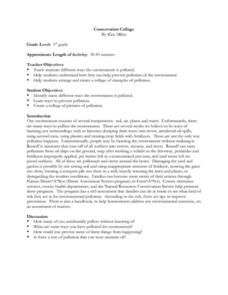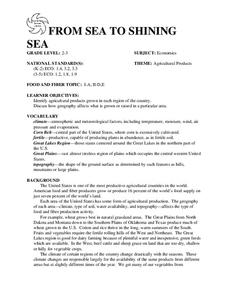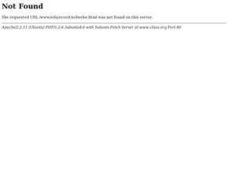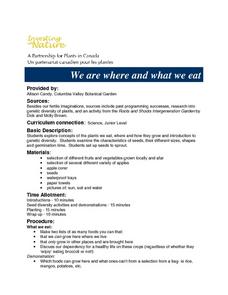Curated OER
The History of Rice
Third graders explore the history of rice. In this history of rice lesson students use a timeline to help determine important events in the spread of rice throughout the world. They use a map to locate rice production in the United States.
Curated OER
Brazil and the Amazon
Sixth graders examine the features of the country of Brazil. In this Geography lesson, 6th graders complete a graphic organizer on the geography of Brazil.
Curated OER
Ancient China Test
In this geography and history test learning exercise, students respond to 25 short answer and multiple choice questions about the history and geography of ancient China.
Curated OER
Life Cycle of Brassica Plants: Planting Seeds
Students explore botany by participating in a calendar class activity. In this plant observation instructional activity, students examine a diagram of a Brassica plant and identify its anatomy before planting their own seeds and viewing...
Curated OER
Eat Your Plants
Students explore fruits and vegetables. In this fruits and vegetables lesson plan, students work in small groups investigating plant parts. Students discover that fruits and vegetables originate from different parts of plants.
Curated OER
Conservation Collage
Students identify many different ways the environment is polluted, and determine ways to prevent pollution. They create a collage of pictures describing how the earth becomes polluted.
Curated OER
FROM SEA TO SHINING SEA
Identify agricultural products grown in each region of the country.
Discuss how geography affects what is grown or raised in a particular area.1. Hand out a copy of the two activity sheets "Food From Sea to Shining Sea" to each student....
Curated OER
Chemicals in Your Life
In this chemicals worksheet, students fill in 61 blanks of statements comparing the chemicals used in farming and the chemicals found in medicines and food.
Curated OER
Science Excursion: Cover Mapping Land
Students study remotely sensed images and topographic maps to classify land cover types in their watershed area. They take samples in the watershed area to interpret the images.
Curated OER
The Trail of a Snack Food
High schoolers identify some of their favorite snack foods. Using this information, they discover the resources needed to produce the food. In groups, they research different alternatives to make their favorite food in order to protect...
Curated OER
Think Green
Students experience and practice compositing and recycling through hands-on-activities. They distinguish between which items from their trash can be recycled, composted and reused. The process for making recycled paper is also covered in...
Curated OER
Trash Disposal Choices
Students investigate the use of landfills. In this landfill use and recycling lesson, students discuss what happens to trash and junk. They review the types of trash before categorizing a list of items they throw away each day. They...
Curated OER
Don't Trust Your Eyes
Students brainstorm a list of possible actions that they could do to protect the water resources from pollution. They create hypotheses and conclusions by completing experiments and observing different pollutants.
Curated OER
Water Pollution Lesson Plan: Don't Trust Your Eyes
Students develop a list of actions they could perform that would protect our water resources from pollution. They formulate hypotheses, conduct experiments and draw conclusions about actual pollutants found in our water supply.
Curated OER
The Macaroni Lab
Students are given an introduction to the "ecosystem", what factors make up an ecosystem (biotic factors, abiotic factors, food chain, producers, consumers and decomposers) and how those factors interact.
Curated OER
Where to shop?
Young scholars study a topic of an environmental nature that is relevant to them (as individuals) on a local level, but with global implications. They consider whether their family's shopping habits have any lasting effects on the...
Curated OER
Using Land
In this land usage learning exercise, students read about farmers in Bolivia are using a system called raised-bed agriculture to feed its people. Students complete 2 short answer questions based on what they read.
Curated OER
The Principles Of Composting
Students put items in a plastic bag and watch the effects of composting. While completing the experiment, students answer questions and ask permission to start their own compost pile at home.
Curated OER
Archaeobotany
Learners study pictures of seeds and the conditions in which they grow during their study of archaeobotany. They infer ancient plant use by looking at archaeobotanical samples. They determine the change of plant use by interpreting a...
Curated OER
Compost Columns
In this unit of lessons, learners examine the role of compost columns and recycling. They create a KWL chart about garbage in Chicago. They also examine life cycles and packaging of everyday products.
Curated OER
What's The Flow?
Students examine urban runoff and identify peak flows. They examine causes for different flow rates, and complete worksheets and a graph.
Curated OER
Turn On A Light And Do Your Own Revegetation
Middle schoolers use electricity and plant a seed to observe the process when coal is the major fuel source to produce electricity. They use the packet of native seeds to experiment with revegetation.
Curated OER
We are where and what we eat
Students explore concepts of plants they eat, where and how they grow and are introduced to genetic diversity. They examine seed characteristics, look at their different sizes, shapes and germination time. They also set up seeds to...
Curated OER
Compost Tag
Students identify biodegradable items. In this environmental lesson, students participate in a game of tag. A student's name is called out along with a biodegradable item and the student is tossed a ball.

























